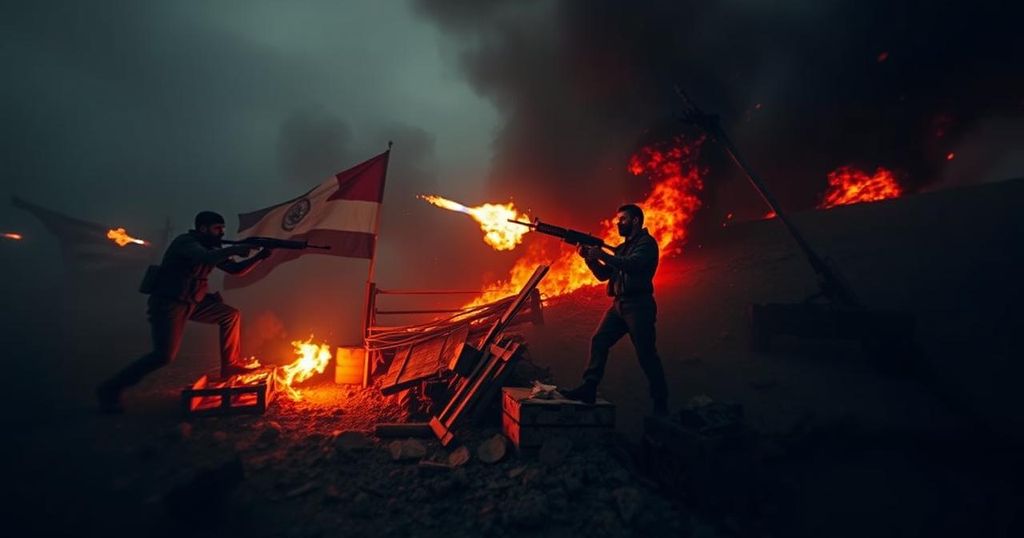Iranian Militias Intensify Assaults on Israel Amid Regional Turmoil
Iran-linked militias in Iraq have escalated their missile, drone, and rocket attacks against Israel in recent weeks, particularly following the death of Hezbollah leader Hassan Nasrallah. This surge in activity marks a strategic pivot by Iran as it seeks to leverage its network of proxies amid heightened tensions in the Middle East, particularly in light of diminished capabilities of Hezbollah and Hamas. The regional response has included increased Israeli military actions against Iranian and affiliated targets in Syria and a vigilant stance concerning Iraqi threats.
In recent weeks, Iran-linked militias operating from Iraq have escalated their attacks on Israel, reportedly launching around 40 incidents involving missiles, drones, and rockets since the initiation of this surge. This uptick in aggression correlates with the ongoing tensions stemming from the Gaza conflict that began last October. Notably, the frequency of these assaults surged following Israel’s airstrike that killed Hezbollah leader Hassan Nasrallah on September 27. Hezbollah, established by Iranian support over four decades ago, remains a pivotal component of a broader coalition of militant entities motivated by Iranian influence in the region. The weakening of Hamas amid the ongoing Gaza conflict and the intensified Israeli operations against Hezbollah have prompted Tehran to mobilize lesser-known factions within its network to carry out strikes against Israel, thereby reinforcing its position against a common adversary. Michael Knights, an analyst from the Washington Institute, highlighted the substantial increase in missile and drone activities originating from Iraqi militias, asserting that they are demonstrating their alliance with Hezbollah. However, he mentions that these Iraqi groups do not exhibit the same level of capability as Hezbollah, which prevents them from matching the intensity of actions seen in the Syrian or Yemeni theaters. The collaborative tension among these militia factions reflects a competitive dynamic, underscoring the broader strategy of Iran in employing its cadre of proxies to undermine Israel’s position in the region. Nonetheless, the threat posed by these militias is compounded by the potential for Israel to retaliate against the various Iranian-backed groups based not just in Iraq but also in Syria and Yemen. Israel has consistently targeted Iranian interests in Syria to secure the supply routes to Hezbollah, which have only heightened in relevance following a series of assassination campaigns against key Iranian figures, including the significant strike that killed a high-ranking commander of Iran’s Quds Force in April. Furthermore, the recent military operations have included precision strikes against weapons production facilities and infrastructure believed to be connected to Iranian militias, all within the context of an escalating conflict that has seen both sides capable of significant retaliatory measures. As the situation evolves, the dynamics in Iraq and Syria remain crucial yet underreported arenas of conflict, suggesting a complex web of regional military engagements with profound implications for all involved parties.
The increased aggression demonstrated by Iran-linked militias from Iraq towards Israel forms part of a broader geopolitical conflict influenced by underlying tensions in the Middle East. Since the outbreak of hostilities in Gaza, these factions have significantly stepped up their military operations against Israel, indicating a strategic maneuver by Iran to substitute Hezbollah’s diminished capacity with other allied groups. The Iranian strategy appears to evolve around employing a network of proxy forces across several countries, including Syria, Iraq, and Yemen, to exert pressure on Israel from multiple fronts. The Sunni-Shia divide, the competition among various militant groups, and the direct military engagements by Israel against Iranian interests all contribute to a volatile landscape marked by constant shifts in allegiance and tactical coordination between these proxies.
In summary, the recent surge in attacks against Israel by Iran-affiliated militias in Iraq highlights a significant escalation in the clandestine proxy warfare permeating the Middle East. Following key losses sustained by their principal ally, Hezbollah, these militias are increasingly being mobilized to assert Iran’s influence and retaliate against Israel. The situation is further complicated by Israel’s active military responses to perceived threats emanating from both Iraq and Syria. The entirety of these developments underscores the complex regional dynamics at play, where proxy warfare plays a pivotal role in shaping the geopolitical landscape.
Original Source: www.theguardian.com




Post Comment